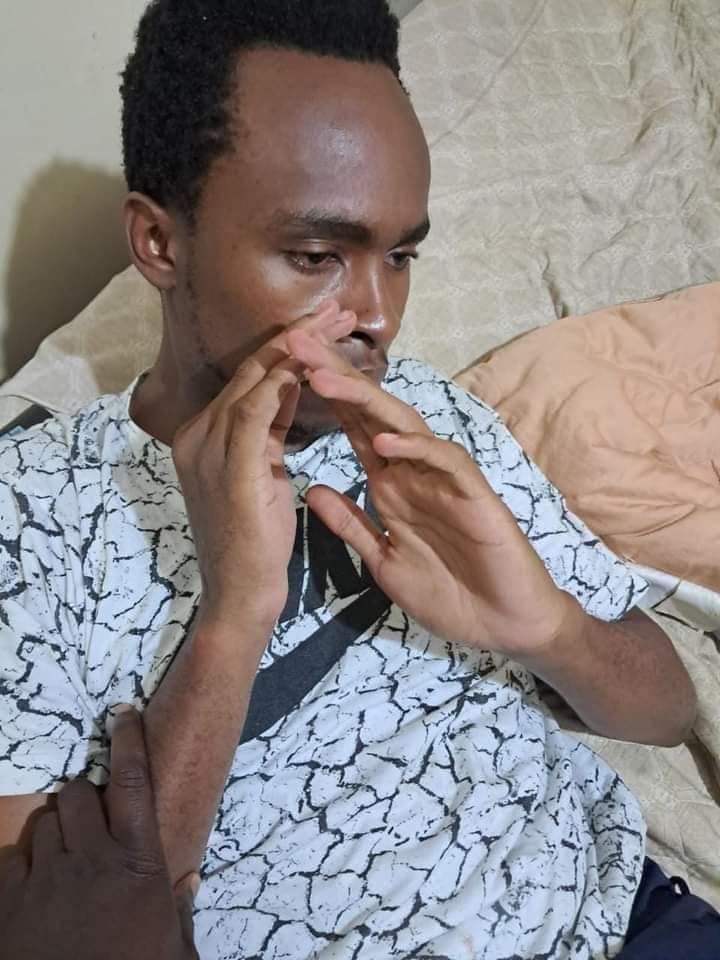
The Incident and Its Aftermath
The recent incident involving 19-year-old Ian Njoroge has sparked outrage and concern across Kenyan society. Njoroge, the son of a teacher, is accused of viciously assaulting a 55-year-old traffic police officer in Kasarani, Nairobi. According to the reports, the officer had approached Njoroge’s vehicle after witnessing him make an illegal U-turn, obstructing other road users. When the officer attempted to apprehend Njoroge and take him to the police station, a confrontation ensued, leading to a physical altercation. Shockingly, Njoroge, despite his young age, was able to overpower the experienced police officer, beating him and causing him to fall into a nearby ditch. Njoroge then proceeded to steal the officer’s mobile phone battery and flee the scene.The officer, identified as Jacob Ogendo, was rescued by members of the public and taken for medical treatment, initially at a wellness center and then transferred to Mama Lucy Kibaki Hospital due to the severity of his injuries. Following a relentless pursuit, Njoroge was eventually tracked down and arrested at his girlfriend’s place in Kayole. During his interrogation, Njoroge claimed that the officer had asked him for a hefty bribe, which led to the confrontation.5



The Troubling Background
What makes this case particularly concerning is the revelation that Njoroge, despite his young age, is no stranger to the criminal justice system.1The police have discovered that he is a known criminal gang leader in Mwiki, with more than ten pending cases against him. The fact that a 19-year-old, whose father is a teacher, has already amassed such a troubling criminal history raises profound questions about the societal and systemic factors that may have contributed to his descent into violence and lawlessness.
The Lessons and Implications
This incident serves as a stark reminder that when a person, especially a young individual, falls into the clutches of criminal behavior, it is not a matter to be taken lightly or mocked. Instead, it should be viewed as a call to action, a chance to learn from the mistakes and find ways to prevent similar occurrences in the future. The Swahili proverb “Asiyefunzwa na mamaye hufunzwa na ulimwengu,” which translates to “He who is not taught by his mother is taught by the world,” holds true in Njoroge’s case. It is clear that his parents, and perhaps the broader community, have failed to instill the values of responsibility, respect for authority, and the consequences of one’s actions.
This case also highlights the importance of addressing the underlying societal issues that can lead young individuals down the path of criminality. It is not enough to simply condemn Njoroge’s actions; we must also examine the systemic challenges, such as lack of access to education, limited economic opportunities, and the influence of negative peer groups, that may have contributed to his behavior.Moreover, the incident serves as a reminder that the police, despite the often-negative perceptions, play a vital role in maintaining law and order and ensuring the safety of the community. Mocking or belittling their efforts can have dire consequences, as demonstrated by Njoroge’s attack on the officer.
The Way Forward
As a society, we have a responsibility to learn from the mistakes of individuals like Ian Njoroge and work towards creating a more just, equitable, and nurturing environment for our youth. This requires a multi-faceted approach that addresses the root causes of criminal behavior and focuses on rehabilitation, rather than solely punishment.
Some potential steps that can be taken include:
- Strengthening Family Support Systems: Investing in programs and initiatives that empower parents and guardians to better support and guide their children, particularly during the critical adolescent years.
- Expanding Educational and Vocational Opportunities: Ensuring that young people have access to quality education, skills training, and meaningful employment prospects, which can serve as alternatives to engaging in criminal activities.
- Enhancing Community Engagement: Fostering stronger connections between law enforcement, local leaders, and community members to build trust, address underlying issues, and create a sense of collective responsibility for the well-being of the youth.
- Implementing Comprehensive Rehabilitation Programs: Developing restorative justice programs that focus on rehabilitation, counseling, and reintegration of offenders back into society, rather than solely relying on punitive measures.
- Improving Mental Health Support: Recognizing the role that mental health challenges can play in shaping an individual’s behavior and ensuring that accessible and affordable mental health services are available.
By taking a holistic and compassionate approach, we can work towards preventing similar incidents and creating a society where young people like Ian Njoroge are empowered to make positive choices and contribute to the betterment of their communities.
Conclusion
The case of Ian Njoroge serves as a sobering reminder that the well-being of our youth is a collective responsibility.When a young person falls, it is not a time for laughter or mockery, but rather a call to action – a chance to learn from their mistakes and work towards a more just, equitable, and nurturing society. By addressing the underlying societal issues, strengthening family and community support systems, and implementing comprehensive rehabilitation programs, we can foster an environment where young people are empowered to make positive choices and become productive members of society.
The true test of our society lies in our ability to learn from the Njoroge’s of the world and to create a future where no young person is left behind.







